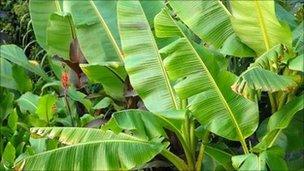Eden Project airtight chamber oxygen test for scientist
- Published

A scientist is to spend 48 hours sealed inside an airtight chamber, surviving on oxygen produced by plants alone.
Iain Stewart, a geoscience professor at the Plymouth University, will carry out the experiment at the Eden Project in Cornwall.
The experiment, which he said was a first for a human, is for a new BBC Two series, How Plants Made The World.
The aim is to demonstrate the importance of plants to human survival as the "lungs of the planet".
Prof Stewart said: "This experiment has never been done before with a human - it seems a fascinating challenge to see if plants really could keep a person alive.
"I cannot think of a more powerful way of driving home to the viewer the importance of photosynthesis."
1772 experiment
Plants take in carbon dioxide and release oxygen using light as energy during photosynthesis.
Prof Stewart will spend 48 hours inside a 12 sq m (130 sq ft) see-through plastic container in Eden's Rainforest Biome on 16 and 17 September.
He will have a hammock to sleep in, a laptop to work on and an exercise bike to keep him moving.
The temperature and humidity will be kept at an optimum level for the plants, rather than for his comfort.
Specialist lights will be placed both inside and outside the chamber to ensure the plants are continuously lit throughout the day and night, providing the energy for photosynthesis to take place.
Specialist doctors from University College London's Centre for Altitude Space and Extreme Environment Medicine and the Royal Free Hospital will monitor Prof Stewart continuously.
He will also be a "guinea pig" for various tests to explore the effects of reduced oxygen.
In 1772, scientist Joseph Priestly conducted a similar experiment, showing that a mouse could survive in an airtight chamber full of plants, but could only live a short time in a box without them.
'Gentle reminder'
Alistair Griffiths, curator of horticulture at Eden, said between 150 and 200 plants have been grown over the past three months for the experiment.
The plants include miscanthus, banana plants, sweetcorn (maize) and a mix of tropical herbs.
Dr Griffiths said these plants were chosen because they have a quicker rate of photosynthesis and can produce the right amount of oxygen.
"Some people know how important plants are but for others they are 'just there'," he told BBC News.
"But this will be a gentle reminder that they're not 'just there'.
"Plants are the things that keep us alive - they produce the oxygen we need to breathe."